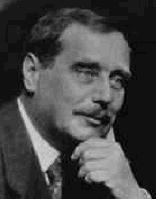H.G.Wells

H.
G. Wells notabiliza-se, antes de mais, enquanto autor de um das mais importantes
obras de ficção científica de todos os tempos
The
Time Machine
(1895)
 |
 |
|
“About eight or nine in the morning I came to the same seat of yellow metal from which I had viewed the world upon the evening of my arrival. I thought of my hasty conclusions upon that evening and could not refrain from laughing bitterly at my confidence. Here was the same beautiful scene, the same abundant foliage, the same splendid palaces and magnificent ruins, the same silver river running between its fertile banks. The gay robes of the beautiful people moved hither and thither among the trees. Some were bathing in exactly the place where I had saved Weena, and that suddenly gave me a keen stab of pain. And like blots upon the landscape rose the cupolas above the ways to the Under-world. I understood now what all the beauty of the Over- world people covered. Very pleasant was their day, as pleasant as the day of the cattle in the field. Like the cattle, they knew of no enemies and provided against no needs. And their end was the same. |
Porém,
para além da ficção científica, a obra de Wells está marcada por uma outra
forte veia utópica que, em arte, passa
pela defesa das virtudes do socialismo
reformista

|
H.G.Wells When the Sleeper
Wakes |
H.G.Wells Anticipations |
|
H.G.Wells A
Modern Utopia |
 |
| ”To anyone who has watched the development of technical science during the last decade or so, there will be no shock in the idea that a general consolidation of a great number of common public services over areas of considerable size is now not only practicable, but very desirable. In a little while heating and lighting and the supply of power for domestic and industrial purposes and for urban and inter-urban communications will all be managed electrically from common generating stations. And the trend of political and social speculation points decidedly to the conclusion that so soon as it passes out of the experimental stage, the supply of electrical energy, just like drainage and the supply of water, will fall to the local authority. Moreover, the local authority will be the universal landowner. Upon that point so extreme an individualist as Herbert Spencer was in agreement with the Socialist. In Utopia we conclude that, whatever other types of property may exist, all natural sources of force, and indeed all strictly natural products, coal, water power, and the like, are inalienably vested in the local authorities (which, in order to secure the maximum of convenience and administrative efficiency, will probably control areas as large sometimes as half England), they will generate electricity by water power, by combustion, by wind or tide or whatever other natural force is available, and this electricity will be devoted, some of it to the authority’s lighting and other public works, some of it, as a subsidy, to the World-State authority which controls the high roads, the great railways, the inns and other apparatus of world communication, and the rest will pass on to private individuals or to distributing companies at a uniform fixed rate for private lighting and heating, for machinery and industrial applications of all sorts. Such an arrangement of affairs will necessarily involve a vast amount of book-keeping between the various authorities, the World-State government and the customers, and this book-keeping will naturally be done most conveniently in units of physical energy.” |
|
H.G.Wells In the Days of the Comet (1906)
|
 |
|
H.G.Wells New
Worlds for Old |
|
| “That Anarchist world, I admit is our dream; ... I... believe - this present world, this planet, will some day bear a race beyond our most exalted and temerarious dreams, a race begotten of our wills and the substance of our bodies, a race, so I have said it, 'who will stand upon the earth as one stands upon a footstool and laugh and reach our their hands amidst the stars,' but the way to that is through education and discipline and law" | |
|
H.G.Wells Men
Like Gods |
Numa
das suas últimas obras, o optimismo de Wells verga-se à denúncia
dos perigos da engenharia genética. A utopia positiva encontra em Wells o seu acabamento na utopia negra
|
H.G.Wells Star-Begotten:
A Biological Fantasia |
| “The life sciences, genetics and robotics may soon
confront us with species of artificial life that may challenge man`s
superiority on this planet. Global
warming may bring desaster to many countries and political tension
between |